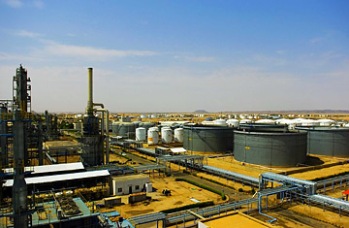Oil figures in Sudan still marred by discrepancy: report
March 16, 2010 (KHARTOUM) — The Sudanese government has failed to follow through on their promise to conduct a full audit into the accuracy of their oil production data in light of significant discrepancy with figures released by the main Chinese oil company operating in the country, UK-based Global Witness said today.
 Last September, the same group alleged that their investigation into the subject revealed that revenues from some oilfields published by Sudan’s Ministry of Finance — among the figures used to calculate the southern share — were lower than revenues for the same oilfields published by operator China National Petroleum Corporation (CNPC).
Last September, the same group alleged that their investigation into the subject revealed that revenues from some oilfields published by Sudan’s Ministry of Finance — among the figures used to calculate the southern share — were lower than revenues for the same oilfields published by operator China National Petroleum Corporation (CNPC).
If true, this meant that South has been shorted millions of dollars in oil revenue. The group said in a release today that the situation has not changed six months after its initial findings.
Global Witness has discovered that oil production figures published by CNPC for 2009 for the blocks it operates in Sudan’s Upper Nile State are 12% bigger than those published by the Sudanese government.
“The difference in question – 12 million barrels of oil – is significant. The oil is worth $370 million and is enough to power a city in the US the size of San Francisco for a year,” said Global Witness campaigner, Rosie Sharpe.
“The authorities in the north are responsible for stating how much oil was produced. The south has no way of checking whether these figures are correct and therefore whether the revenues the southern government receive are correct. This is a critical issue and one which could be decisive in determining whether the upcoming referendum on independence passes off peacefully.”
Under the 2005 peace accord, both sides agreed to share the country’s oil wealth, with the south receiving half the state revenues from the oil drilled from its territory.
Sudan currently produces 500,000 barrels of oil per day and hoping to expand productivity to 600,000.
“While it is impossible to know for sure which figures are correct, it is clear that both cannot be. Six months after we first raised this issue we still haven’t seen the reforms that are necessary and that have been promised. The continued discrepancies are a cause for grave concern and cast a shadow over the prospects for peace,” said Sharpe.
“The authorities in the north have not done enough to allay the suspicion held by many southerners that they are underreporting the volume of oil produced in order to transfer less money to the southern government than is due under the peace agreement. Transparency – of which a first step is conducting an audit – will be needed for both sides to trust the current revenue sharing agreement, and any future one,” said Sharpe.
The group said that they put the allegations of production discrepancies to the Ministry of Finance and CNPC but has yet to receive a reply from either.
Global Witness said it has also discovered that the pipeline fees stated by the Sudanese government do not match those stated by the Central Bank of Sudan in 2005, 2006 and 2008.
In response to an inquiry from Global Witness, the Ministry of Finance said that that they are using two different methods of accounting meaning they cannot be compared. In 2006 alone the difference amounted to $162 million.
“While the two accountancy methods do generate different figures – as one relies on the date the fees are incurred whereas the other relies on the date they are paid – it is difficult to see how this alone could generate such large discrepancies”.
Next year South Sudan will decide in a referendum vote whether they want to remain part of a united Sudan or establish their own state.
About 75 per cent of Sudan’s proven reserves of 6.3bn barrels are in the south but the pipeline that carries the oil to export terminals and refineries runs through the north. The south needs Khartoum’s co-operation to sell its oil; the north needs revenues from its neighbor’s resources.
(ST)

Malou Manyiel
Oil figures in Sudan still marred by discrepancy: report
God help us!! we are not benefiting from our own resouces.
Despite the agreements, the North still cheating the South in wealth sharing.
The distant to referendum is just an inch.